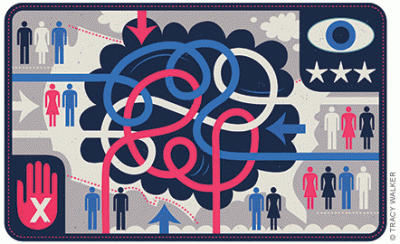
In contemporary politics and punditry, there is hardly a shortage of commentary on immigration reform. Yet a talkative public is not necessarily an enlightened one. As associate professor of criminology Emily Owens pointed out in a lecture in June, most Americans know surprisingly little about immigration and immigration reform. Owens’s talk was an installment of the Penn Lightbulb Café, a lecture series held at the World Café Live where faculty can share research with the greater Philadelphia community [“Gazetteer,” May|June 2013]
Owens noted that most Americans believe that about one in three people living in the United States are foreign born. Actually, it’s closer to one in 10. Similarly, immigrants, especially undocumented ones, are commonly believed to be dangerous. But in fact, native-born Americans are statistically more likely to commit crime.
Nonetheless, according to Owens, the potential for criminal activity (above and beyond tax evasion) represents the most common anxiety Americans have about illegal immigrants. And, perversely, the resulting public policy may be turning this fear into a self-fulfilling prophecy.
US policy currently focuses on discouraging illegal immigration by punishing employers of illegal immigrants. Owens presented evidence that this may inadvertently drive illegal immigrants toward criminal behavior by limiting legal employment opportunities.
She shared a study she co-authored examining the effects of the Immigration Reform and Control Act of 1986 (IRCA) on San Antonio and its immigrant population. IRCA provided a pathway to citizenship for immigrants who entered the country before 1982, but it also made it illegal for employers to hire undocumented immigrants—and burdened employers with a requirement that they attest to their employees’ immigration status.
“On average, it looks like in San Antonio, the federal government created about 100 to 200 more felonies each year because of this restricted access to labor-market opportunities,” Owens said. “For about every hundred people coming over,” she elaborated, “four to eight more crimes” occurred than would have been expected under normal conditions.
“This isn’t something inherent about the immigrants themselves. This is something we created with our policies,” Owens said.
“We should be very worried about the unintended consequences of our favorite way to reform immigration policy. Because by making employers suffer consequences from hiring immigrants, by putting up barriers to hire illegal immigrants, we’re potentially depressing illegal immigrants’ wages—and therefore making them more likely to commit crime, based on economic models of rational behavior. But that’s why we don’t like illegal immigration in the first place.”


Why was nothing mentioned about the positive effects of enforcement of immigration laws and the deportation of people who reside here illegally? Did anyone involved with this article research the few places in The United States that were able to enforce immigration laws, and that it resulted not only in most of the illegals leaving the area, but with unemployed Americans taking the vacated jobs in factories, motels/hotels, restaurants, and construction — those jobs that Americans supposedly won’t do? Are you going to give that tired (and inaccurate) old argument that illegal aliens help our economy, when in reality the majority are really here to send money back to their home countries? The amount of money that legal and illegal US residents sent to Mexico alone was $52 billion in 2013 — that’s a lot of money not spent on businesses and services within the U.S. So, whose economy does that help (and that’s only the figures for Mexico)? You do know we have an unbelievably high national debt, don’t you? And if they “only came here for a better life,” do you really think that’s our problem to solve — especially now with all the problems we have? What about DREAMers, most of whom came from families who do not pay taxes with ITINs, who never once said they were thankful for the free education and now demand more. Don’t you find that selfish? Doesn’t it make you angry? When I found out about illegals with ITINs claiming Child Tax Credits for children who have never resided here, and that the IRS had known about it for years, I went through the roof.
You see, there are plenty of real issues that you could have tackled, instead of something academic that really has no basis in reality whatsoever.
Well, the “talkative public” is more enlightened than you think (and obviously more so than anyone connected with this article). The memberships of several of the online groups against illegal immigration have jumped up by at least a thousand every few weeks since 2013. People share relevant, factual articles and information that isn’t often picked up by the national news media. The members are not just Tea Party or Conservatives anymore, it’s people from all over — and we’re justifiably angry — especially when we come across articles like this one that consider enforcement of workplace immigration laws to be “punishing employers” — Are you all insane?